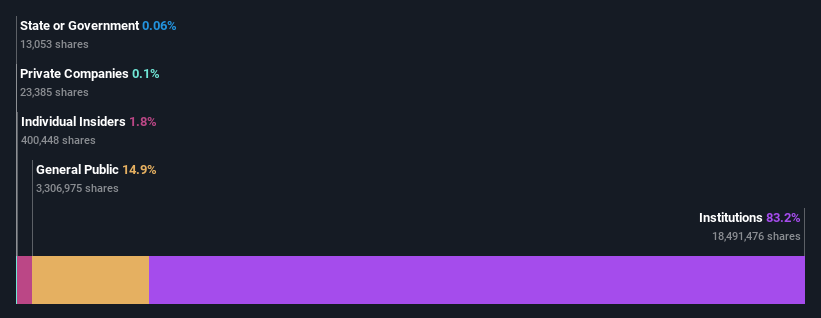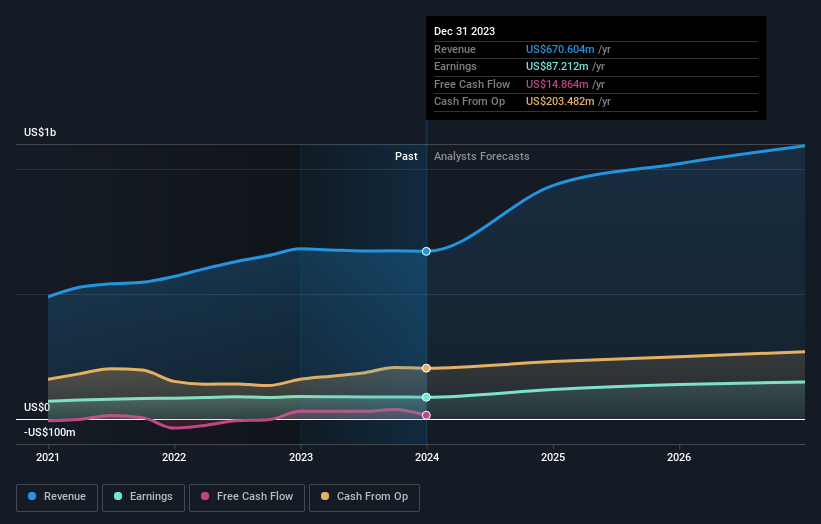Chesapeake Utilities Corporation's (NYSE:CPK) latest 4.9% decline adds to one-year losses, institutional investors may consider drastic measures
Key Insights
Institutions' substantial holdings in Chesapeake Utilities implies that they have significant influence over the company's share price
The top 10 shareholders own 51% of the company
A look at the shareholders of Chesapeake Utilities Corporation (NYSE:CPK) can tell us which group is most powerful. We can see that institutions own the lion's share in the company with 83% ownership. Put another way, the group faces the maximum upside potential (or downside risk).
And institutional investors endured the highest losses after the company's share price fell by 4.9% last week. This set of investors may especially be concerned about the current loss, which adds to a one-year loss of 21% for shareholders. Often called “market movers", institutions wield significant power in influencing the price dynamics of any stock. Hence, if weakness in Chesapeake Utilities' share price continues, institutional investors may feel compelled to sell the stock, which might not be ideal for individual investors.
Let's delve deeper into each type of owner of Chesapeake Utilities, beginning with the chart below.
View our latest analysis for Chesapeake Utilities
What Does The Institutional Ownership Tell Us About Chesapeake Utilities?
Many institutions measure their performance against an index that approximates the local market. So they usually pay more attention to companies that are included in major indices.
As you can see, institutional investors have a fair amount of stake in Chesapeake Utilities. This can indicate that the company has a certain degree of credibility in the investment community. However, it is best to be wary of relying on the supposed validation that comes with institutional investors. They too, get it wrong sometimes. When multiple institutions own a stock, there's always a risk that they are in a 'crowded trade'. When such a trade goes wrong, multiple parties may compete to sell stock fast. This risk is higher in a company without a history of growth. You can see Chesapeake Utilities' historic earnings and revenue below, but keep in mind there's always more to the story.
Since institutional investors own more than half the issued stock, the board will likely have to pay attention to their preferences. Hedge funds don't have many shares in Chesapeake Utilities. BlackRock, Inc. is currently the largest shareholder, with 16% of shares outstanding. With 9.8% and 7.8% of the shares outstanding respectively, T. Rowe Price Group, Inc. and The Vanguard Group, Inc. are the second and third largest shareholders.
We also observed that the top 10 shareholders account for more than half of the share register, with a few smaller shareholders to balance the interests of the larger ones to a certain extent.
Researching institutional ownership is a good way to gauge and filter a stock's expected performance. The same can be achieved by studying analyst sentiments. There are plenty of analysts covering the stock, so it might be worth seeing what they are forecasting, too.
Insider Ownership Of Chesapeake Utilities
The definition of company insiders can be subjective and does vary between jurisdictions. Our data reflects individual insiders, capturing board members at the very least. Management ultimately answers to the board. However, it is not uncommon for managers to be executive board members, especially if they are a founder or the CEO.
Insider ownership is positive when it signals leadership are thinking like the true owners of the company. However, high insider ownership can also give immense power to a small group within the company. This can be negative in some circumstances.
We can see that insiders own shares in Chesapeake Utilities Corporation. This is a big company, so it is good to see this level of alignment. Insiders own US$40m worth of shares (at current prices). Most would say this shows alignment of interests between shareholders and the board. Still, it might be worth checking if those insiders have been selling.
General Public Ownership
The general public, who are usually individual investors, hold a 15% stake in Chesapeake Utilities. While this size of ownership may not be enough to sway a policy decision in their favour, they can still make a collective impact on company policies.
Next Steps:
While it is well worth considering the different groups that own a company, there are other factors that are even more important. Like risks, for instance. Every company has them, and we've spotted 3 warning signs for Chesapeake Utilities (of which 1 is a bit unpleasant!) you should know about.
But ultimately it is the future, not the past, that will determine how well the owners of this business will do. Therefore we think it advisable to take a look at this free report showing whether analysts are predicting a brighter future.
NB: Figures in this article are calculated using data from the last twelve months, which refer to the 12-month period ending on the last date of the month the financial statement is dated. This may not be consistent with full year annual report figures.
Have feedback on this article? Concerned about the content? Get in touch with us directly. Alternatively, email editorial-team (at) simplywallst.com.
This article by Simply Wall St is general in nature. We provide commentary based on historical data and analyst forecasts only using an unbiased methodology and our articles are not intended to be financial advice. It does not constitute a recommendation to buy or sell any stock, and does not take account of your objectives, or your financial situation. We aim to bring you long-term focused analysis driven by fundamental data. Note that our analysis may not factor in the latest price-sensitive company announcements or qualitative material. Simply Wall St has no position in any stocks mentioned.


